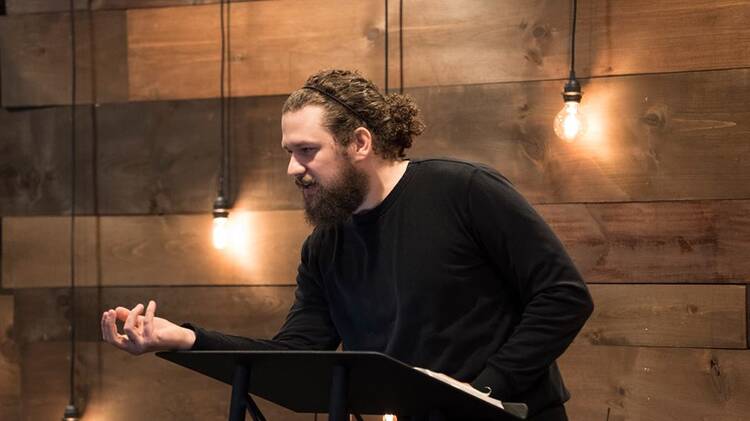Seed capital. Incubators. Launch Sunday. MailChimp. These are not the word most Catholics use when talking about the faith. Sure, we want the church to grow and reach the unchurched multitudes. But we prefer catchy terms like “The New Evangelization” and “Synod on Young Adults.” Evangelicals in the church planting movement, on the other hand, are happy to borrow the lingo and entrepreneurial zeal of Silicon Valley in their efforts to save souls and spread the good news.
A new series from Gimlet Media’s “Startup” podcast follows one church planter, AJ Smith, as he works to turn a struggling storefront congregation in Philadelphia into a sustainable Christian community. At the beginning of the six-episode season, we learn that AJ has one year to double the size of his church or risk losing funding from the well-resourced Acts 29 church-planting network. He faces some significant hurdles. For one, he is, in the words of the show’s host, Eric Mennel, “a reticent white guy, who’s taken over a majority black congregation.” Then there’s the money: While most church plants are situated in wealthy or gentrifying areas, AJ intentionally put down roots in an underserved inner-city neighborhood. His decision makes good Gospel sense, but it is a risky one for a man whose job security depends on the collection basket.
Church planters are happy to borrow the lingo and entrepreneurial zeal of Silicon Valley in their efforts to save souls.
“There’s this central tension in church planting,” Eric says in the first episode, “between being a humble pastor and a successful entrepreneur.” The question is whether soft-spoken but passionate AJ (memorably described by his larger-than-life African-American mentor as a “quiche with some hot sauce”) can convince enough people to join his church—a tough sell in a world increasingly indifferent or hostile to Christian beliefs.
Catholics should be interested in the answer, even if the more centralized, hierarchical structure of the Roman church precludes us from church planting. AJ confronts challenges that will resonate with many listeners: How do you welcome L.G.B.T. people while holding on to traditional teachings about human sexuality? How do you form humble pastors when positions of authority within the church tend to attract, in the words of AJ’s wife, Leah, “powerful, very autonomous, narcissistic monsters”? How much longer will women accept being locked out of leadership roles?
To its credit, the podcast does not give any easy answers. At the same time, it poses an even more fundamental question: Why join a church at all? Or, closer to home for the host, why do people leave their church? Eric tells us at the beginning that he is Christian but stopped going to church a year ago. He speaks movingly about his inability to trust God or his church or himself. Thanks to his and AJ’s vulnerability throughout, the series is about something even more interesting and mysterious than the business of building churches; it is about faith, how we share it and where we turn when we lose it.










Church on the margins and peripheries has a rich history. In fact the margins and the peripheries are in danger of being the center of the Church.